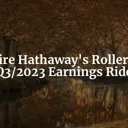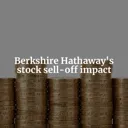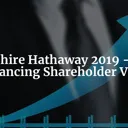Tags: Cash / Risk / BofA
This fanpage is not officially affiliated with Berkshire Hathaway: Disclaimer
In a landscape teetering on high valuations and economic uncertainty, Berkshire Hathaway's recent stock sales and impressive cash reserves signal strategic foresight. Join us as we explore Warren Buffett's bold moves, their implications for the market, and what they mean for your investments in this captivating analysis.
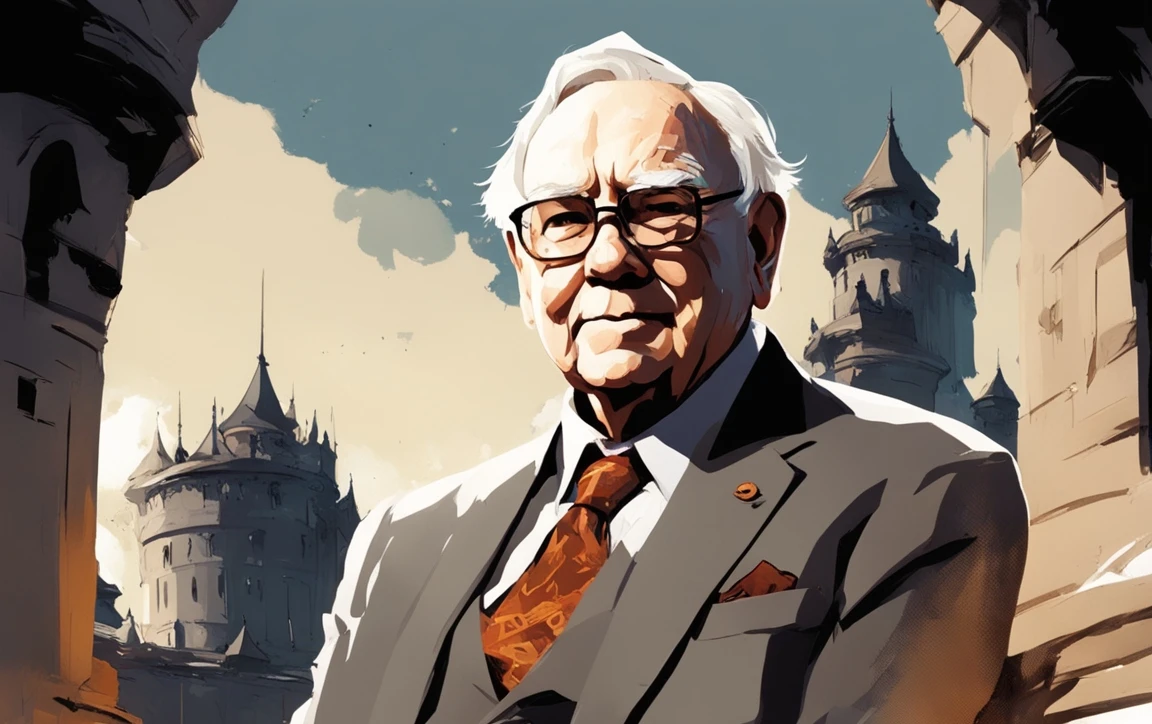
Introduction
In the world of investing, few names command as much respect and attention as Warren Buffett and his conglomerate, Berkshire Hathaway. Known for his market foresight and prudent investment strategies, Buffett's moves are closely watched by investors and analysts alike. Recently, Berkshire Hathaway has been making headlines with a series of significant stock sales, leaving many to wonder if these actions are a precursor to a looming market crash.
Berkshire's recent actions are particularly noteworthy given the current market conditions. With rising valuations, economic uncertainties, and geopolitical tensions, the market is rife with speculation. Against this backdrop, Berkshire's decision to sell substantial holdings in major companies raises important questions about the future direction of the market.
The objective of this article is to delve into Berkshire Hathaway's recent stock sales, analyze the potential implications, and explore whether these moves signal an impending market downturn. For shareholders of Berkshire Hathaway, understanding these strategic decisions is crucial, as it provides insights into the company's future direction and potential risks.
Join us as we embark on a thorough, interesting, and entertaining discussion of Berkshire's bold moves and what they might mean for the market and your investments.
The Recent Selling Spree
Berkshire Hathaway's recent selling spree has caught the attention of investors worldwide. In a notable move, the conglomerate sold nearly 19 million shares of Bank of America (BofA), raising approximately $800 million 1. This sale is part of a broader trend, as Berkshire has been on a consecutive six-day selling streak, unloading a total of 52.8 million BofA shares worth $2.3 billion 2.
These sales have reduced Berkshire's stake in BofA to 12.5%, down from its previous holding of 12.6% 2. While Berkshire still holds a substantial 980 million shares of BofA, valued at around $41 billion, the potential for further sales looms large 1. This reduction marks the first significant decrease in Berkshire's BofA stake since the fourth quarter of 2019 2.
The recent sales are not limited to BofA. Berkshire has also reduced its holdings in other major companies. For instance, Buffett sold nearly $20 billion worth of stocks from Berkshire's portfolio in the last quarter, including a 13% reduction in Apple shares and a complete exit from Paramount Global 5. Additionally, Berkshire has been trimming its stake in BYD, a Chinese electric vehicle maker, reducing its holding to below 5% 3.
These moves are significant in the context of Berkshire's overall investment strategy. Historically, Buffett has shown a preference for holding onto high-quality stocks for the long term. However, the recent flurry of sales suggests a strategic shift. One potential reason for these sales could be to reduce Berkshire's BofA stake below 10%, thereby avoiding the requirement to disclose stock purchases or sales within two business days 4.
Buffett's history of selling big holdings is well-documented. In recent years, Berkshire has exited positions in U.S. Bancorp, Wells Fargo, Goldman Sachs, and JPMorgan Chase 4. This pattern of divestment, coupled with the recent sales, indicates a cautious approach in response to current market conditions.
Another factor to consider is Buffett's preference for share repurchases over dividends as a means of returning capital to shareholders. Recently, Berkshire repurchased $2.2 billion worth of its own shares 5. This move not only reflects confidence in the company's long-term prospects but also highlights the strategic importance of maintaining high liquidity and flexibility.
In uncertain market conditions, liquidity is king. By selling off significant holdings and repurchasing its own shares, Berkshire is bolstering its cash reserves, positioning itself to capitalize on future opportunities or weather potential downturns ↗. For shareholders, these actions underscore the importance of staying informed and making strategic decisions based on a thorough understanding of Berkshire's moves.
As we continue to analyze Berkshire's recent actions, it's crucial to consider the broader economic context and historical precedents. In the following sections, we'll explore these aspects in greater detail, providing a comprehensive view of what Berkshire's bold moves might mean for the market.
Cash is King: Berkshire’s Massive Reserves
When it comes to financial fortitude, few companies can match the prowess of Berkshire Hathaway. As of March 2024, Berkshire boasts an impressive $188.99 billion in cash and cash equivalents 8. This substantial reserve is not just a testament to the company's robust earnings but also a strategic buffer in the face of uncertain market conditions. It is even anticipated that Berkshire clearly exceeds $200 billion in cash reserves by the time of writing - the Q2 2024 report will be released on August 2nd 2024.
Warren Buffett, the legendary CEO of Berkshire Hathaway, has long been an advocate of maintaining high liquidity. His recent actions underscore this philosophy. Over the last quarter, Buffett added over $21 billion in cash and short-term Treasuries to Berkshire's balance sheet 5. This move is particularly prudent given the current environment of high short-term interest rates, which provide an attractive return on cash holdings.
Buffett's preference for short-duration bonds over long-duration ones is a calculated strategy. Short-term Treasuries offer greater flexibility and reduced interest rate risk, allowing Berkshire to capitalize on opportunities as they arise without being locked into long-term commitments. This approach is reminiscent of Berkshire's historical periods of high liquidity, where the company has always been prepared to pounce on lucrative investments during market downturns.
The strategic importance of maintaining such a massive cash reserve cannot be overstated. In times of market volatility, having substantial liquidity allows Berkshire to act swiftly and decisively. It provides a cushion against economic shocks and positions the company to acquire undervalued assets when others are forced to sell. As Buffett himself has noted, "I don't mind at all under current conditions building the cash position"5.
In essence, Berkshire's $188.99 billion cash reserve is not just a safety net; it's a powerful tool that offers both security and opportunity. By holding significant cash and short-term investments, Berkshire is well-positioned to navigate the complexities of today's financial landscape and seize opportunities that others might miss.
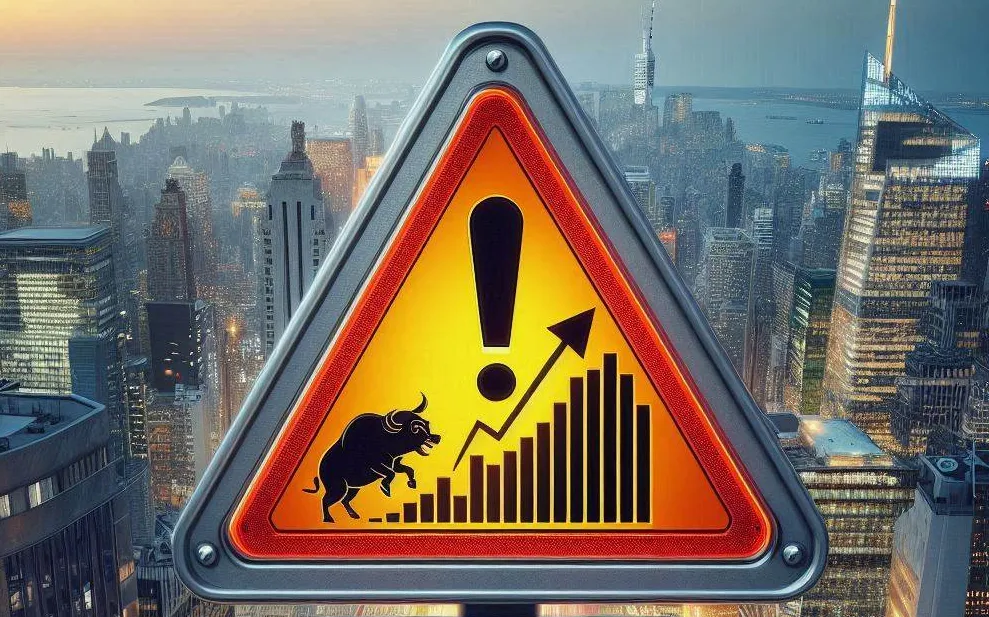
High Valuations and Market Warnings
The current state of the US equity market is raising eyebrows among seasoned investors, and for good reason. The Buffett Indicator, which measures the total US market cap relative to US GDP, has hit a record high of 200%7. This surpasses even the previous peak of 197% seen in November 2021, signaling that the market may be in precarious territory.
Historically, the Buffett Indicator has been a reliable gauge of market valuations. During the 2000 dot-com bubble, the indicator peaked at about 190%, a level that Buffett himself described as "a very strong warning signal"7. The subsequent market crash validated this warning, as overvalued tech stocks plummeted. Similarly, elevated levels were observed before the 2008 financial crisis, further underscoring the indicator's predictive power.
Adding to the chorus of caution is John Hussman, a market bear known for his accurate predictions of the 2000 and 2008 crashes. Hussman warns that stock valuations have reached all-time highs, indicating poor long-term returns6. His preferred valuation measure, which compares the total market cap of non-financial stocks to total revenue, recently hit its highest extreme in history. According to Hussman, the current levels suggest -6% annualized returns over the next 12 years, with the S&P 500 needing to fall by just over 70% to reach historical valuation norms6.
These high valuations have significant implications for investors. Investing in an overvalued market can lead to substantial losses, as history has shown. The dot-com bubble and the 2008 financial crisis serve as stark reminders of the risks associated with inflated valuations. For Berkshire Hathaway, these warnings are not taken lightly ↗. Buffett's recent actions, including the sale of nearly $20 billion worth of stocks and the addition of substantial cash reserves, may be a strategic response to these valuation concerns5.
The combination of the Buffett Indicator's record high and Hussman's dire warnings paints a sobering picture of the current market landscape. While the future is always uncertain, the lessons from past market bubbles and crashes suggest that caution is warranted. Berkshire Hathaway's recent moves reflect a prudent approach to navigating these turbulent waters, emphasizing the importance of liquidity and strategic foresight in times of high market valuations.
Lessons from the Dot-Com Bubble
The dot-com bubble of the late 1990s and early 2000s offers a poignant lesson for today's investors. During this period, Warren Buffett was a vocal critic of the "irrational exuberance" that had gripped the stock markets. In 1999 and early 2000, investors harbored unrealistic return expectations, with a Paine Webber-Gallup survey showing that they anticipated average annual returns of 19% over the next decade9. Buffett warned that the high returns from technology stocks in 1998 and 1999 had led to a dangerous complacency among investors. He famously compared their behavior to "Cinderella at the ball," cautioning that overstaying the festivities would eventually lead to a transformation back into pumpkins and mice9.
Buffett's skepticism was not unfounded. He argued that "value is destroyed, not created, by any business that loses money over its lifetime," a pointed critique of many dot-com companies whose business models he likened to "the old-fashioned chain letter"9. As the bubble burst, these warnings proved prescient, leading to significant market corrections and financial losses for many investors.
In contrast to the tech frenzy, Berkshire Hathaway took a more conservative approach. In 2000, the company made several strategic acquisitions, none of which involved technology stocks. Here’s a breakdown of Berkshire's acquisitions in 2000 9:
| Company | Sector |
|---|---|
| MidAmerican Energy | Energy |
| Cort Business Services | Furniture Rental |
| US Liability | Insurance |
| Justin Industries | Boot and Bricks Manufacturing |
| Shaw Industries | Carpeting Manufacturing |
| Benjamin Moore Paint | Paint Manufacturing |
| Johns Manville | Insulation and Roofing Products |
This cautious strategy helped preserve Berkshire's value during the market downturn. By focusing on fundamentally strong businesses with tangible assets and steady cash flows, Berkshire avoided the pitfalls that ensnared many tech-heavy portfolios.
For today's investors, the lessons from the dot-com bubble are clear. Prudent investment strategies that prioritize long-term value over short-term gains can provide a buffer against market volatility. By avoiding the allure of speculative bubbles and focusing on solid, value-driven investments, one can navigate turbulent market conditions more effectively.
The Broader Economic Context
Understanding the current economic landscape is crucial for making informed investment decisions. Presently, several economic indicators suggest caution. The unemployment rate has risen to 4.1%, up from 3.4%, and the year-over-year growth of full-time employees is in recessionary territory6. These metrics signal potential economic headwinds that could impact market performance.
Adding to the complexity, concerns over frothy valuations and AI-related investor jitters have led to a recent sell-off in Big Tech stocks. Companies like Amazon, Apple, Nvidia, Alphabet, Meta, and Microsoft have all seen declines, with Nvidia losing 1.7% and Alphabet dropping 3%10. Analysts expect increased volatility in tech stocks as more earnings reports are released, particularly those related to AI-driven businesses10.
The broader economic trends also reflect a period of heightened uncertainty. John Hussman, a market bear known for accurately predicting the 2000 and 2008 crashes, warns that stock valuations are at record highs, suggesting poor long-term returns6. His preferred valuation measure, the total market cap of non-financial stocks to total revenue, recently hit an all-time high, surpassing levels seen in 1929, 2000, 2008, and 20226. This measure indicates that the S&P 500 would need to fall by just over 70% to reach historical valuation norms, suggesting a potential market correction.
Historical economic cycles and market corrections provide valuable context for understanding current conditions. Periods of economic expansion are often followed by contractions, and high market valuations typically precede corrections. These cycles underscore the importance of Berkshire's recent actions and its strategy of maintaining massive cash reserves. By holding substantial cash, Berkshire is well-positioned to capitalize on opportunities that arise during market downturns, much like it did during the dot-com bubble.
In summary, the current economic indicators and market conditions warrant a cautious approach. By drawing on historical lessons and maintaining a focus on long-term value, investors can navigate the complexities of the market and make informed decisions that align with their financial goals.

Conclusion
Berkshire Hathaway's recent actions—marked by significant stock sales, a substantial cash reserve, and a cautious stance toward high market valuations—serve as critical indicators for shareholders navigating today's complex investment landscape. The conglomerate's decision to reduce its stake in major companies like Bank of America and Apple, while simultaneously bolstering its cash position to an impressive $188.99 billion, reflects a strategic pivot in response to a market characterized by elevated valuations and economic uncertainty.
As highlighted throughout this article, the Buffett Indicator has reached alarming heights, signaling potential overvaluation reminiscent of previous market bubbles. Historical precedents, such as the dot-com bubble, remind us of the perils associated with speculative investing and the importance of a disciplined approach. Warren Buffett's historical reputation for market foresight and prudent investment strategies underscores the necessity for shareholders to remain vigilant and informed in the face of these developments.
For investors, understanding Berkshire's recent moves is paramount. The company's emphasis on maintaining liquidity positions it to capitalize on future opportunities, especially during potential market downturns. This strategy not only provides a buffer against economic shocks but also reflects Buffett's long-standing philosophy of prioritizing value over speculation.
As we look ahead, the broader economic context—marked by rising unemployment rates and concerns over frothy valuations—calls for a cautious approach. Shareholders should take note of these factors and consider how they may impact Berkshire Hathaway's future actions. By staying informed and aligning investment strategies with Berkshire's prudent approach, investors can better navigate the uncertainties of the market.
In essence, Berkshire Hathaway's bold moves are not merely reactive but are indicative of a forward-looking strategy aimed at safeguarding and enhancing shareholder value ↗. As we continue to witness market fluctuations, the lessons of history remind us that patience, prudence, and preparedness are vital attributes for successful investing. With Buffett at the helm, Berkshire Hathaway remains a beacon of resilience and strategic insight, poised to navigate whatever challenges lie ahead.
References
-
Warren Buffett’s Berkshire Hathaway Sells More Bank of America Stock - www.barrons.com ↩↩
-
Berkshire Hathaway dumps $2.3 billion of Bank of America shares in a 6-day sale - www.cnbc.com ↩↩↩
-
Berkshire Hathaway cuts stake in China's BYD to below 5% - www.reuters.com ↩
-
Warren Buffett Is in a Selling Mood. What’s Next? - www.barrons.com ↩↩
-
Warren Buffett Sold Apple and Paramount. Here's What He's Buying Instead. - finance.yahoo.com ↩↩↩↩↩
-
A notorious market bear who called the 2000 and 2008 crashes warns his favorite valuation measure just hit all-time highs — setting stocks up for a potential 70% drop - www.businessinsider.com ↩↩↩↩↩
-
'The S&P 500 is incredibly dangerous': Why Warren Buffett's favorite valuation indicator is flashing a warning for stocks - markets.businessinsider.com ↩↩
-
Berkshire Hathaway (BRK-B) - Cash on Hand - companiesmarketcap.com ↩
-
Warren Buffett: 'I told you so' - news.bbc.co.uk ↩↩↩↩
-
Big Tech stocks nosedive as frothy valuations, AI jitters spook investors - m.economictimes.com ↩↩
